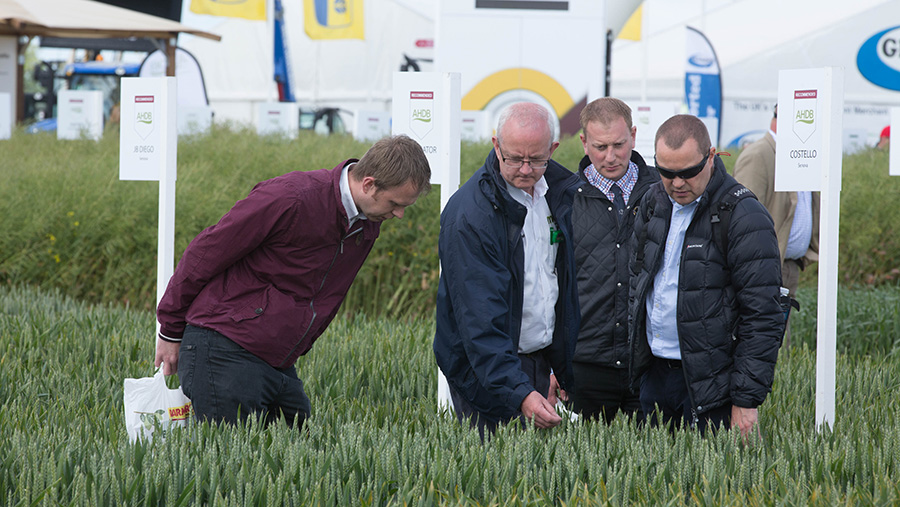Bright future for new, ‘more forgiving’ wheat varieties
 Growers checking out wheat at Cereals 2015 © Tim Scrivener
Growers checking out wheat at Cereals 2015 © Tim Scrivener Winter wheat varieties with good disease resistance are set to attract growers’ interest this year due to their economic and agronomic advantages.
It is not just the scope to cut inputs that is putting these varieties in the spotlight, but also the decline in fungicide performance, changing pathogen populations, workload pressures and unpredictable weather.
Not surprisingly, varieties that reduce growing and marketing risks are finding favour, with market share being taken by the likes of Skyfall, Evolution, Revelation and Crusoe.
Now the seed trade is predicting an equally bright future for Siskin, Illustrious, Graham and Costello as high, untreated fungicide yields are a feature of all four varieties.
See also: Reduce risk with better-informed wheat variety selection
These varieties bring two clear advantages to a farming business, believes independent wheat consultant Bill Angus.
“These types provide you with both insurance and greater flexibility. But, in my view, it’s a mistake to automatically assume that switching to them will always bring you cost savings,” he says.
Get out of jail card
That is because good disease control is still a balance between genetics and fungicide chemistry, with seasonal factors also having a bearing.
“As more resistant varieties are being introduced, this balance is certainly shifting towards genetics.
“However, chemistry will continue to add value, because it protects the variety’s potential,” he adds.
Mr Angus describes these more resistant varieties as a “get out of jail” card.
“They give you a wider window for spraying and are more forgiving, which is invaluable on many farms today. The practicalities of getting round all of your wheat at the optimal timing are very challenging,” he says.
A better understanding of genetic disease resistance on the farm would help growers with their variety selection.
“It would give them an appreciation of the threats to certain varieties, as well as the best mix of varieties for their farm.
“It all comes down to managing risk. We’ve seen an end to the boom and bust days of high risk, high output varieties,” he says
Potential savings
Suffolk grower Tom Jewers treated all of his three winter wheat varieties with the same fungicide programme last year, despite having opted to include Evolution in the line-up.
Even though it had stronger disease-resistance ratings than his other varieties, Gator and Santiago, he decided to apply the same inputs to Evolution.
“We spent a bit more than usual, due to the potential septoria threat. All of the wheat received £137/ha worth of fungicide, regardless of their Recommended List scores,” Mr Jewers says.
He admits that his nerve failed him when it came to cutting back on fungicides, although he is interested in the potential savings that more-resistant varieties could offer.
“At the moment, we are using them to give us a bit more leeway, or flexibility,” he adds.
“They can be sprayed after the more susceptible types. Their in-built resistance keeps any disease out for longer, so we can prioritise our spraying. And if the weather breaks, we are still covered,” Mr Jewers says.
Cutting costs
At Squab Hall Farm in Warwickshire, AHDB Monitor Farm manager Rob Fox also included Evolution in his wheat area, to investigate if its genetic strengths could reduce his growing costs.
He took the decision to replace Kielder, after its yellow rust rating fell to a 3, and grew Evolution alongside Santiago, which has always performed well at Squab Hall.
“Although it has better ratings for most of the diseases, Evolution doesn’t have orange wheat blossom midge resistance, which Kielder did. So there can be a trade-off,” he says.
Mr Fox estimates that he spent about £15/ha less on fungicides on the Evolution compared with Santiago.
“Both varieties yielded very well, at 10-11t/ha. Of course, we also know that high disease ratings can change suddenly, so we still have to monitor crops closely,” he adds.
Cereals event
Find out more about the range of varieties available for drilling next season at this year’s Cereals event, which will include all the top breeders exhibiting their latest offerings.
This year’s Cereals event is on 15 and 16 June at Chrishall Grange, Cambridgeshire.
For more information and to buy tickets in advance, visit the Cereals event website at www.cerealsevent.co.uk

